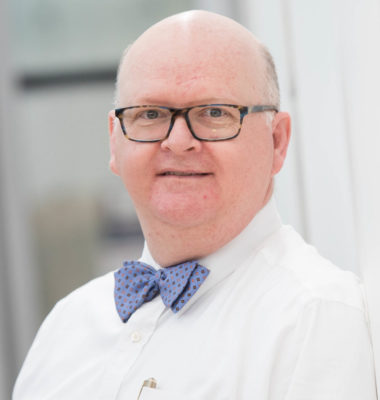Martin McKeown
MD
Professor & Head, Division of Neurology, Department of Medicine, Faculty of Medicine, UBC
Director, Pacific Parkinson's Research Centre
John Nichol Chair in Parkinson's Research
Honorary Visiting Professor, Lee Kong Chian School of Medicine and Department of Computer Science, Nanyang Technological University, Singapore
Full Member
Dr. Martin McKeown, the John L. Nichol Chair in Parkinson’s Research, is a tenured Professor and Head of the Division of Neurology at the University of British Columbia (UBC), where he is also an associate member of the Department of Electrical and Computer Engineering. Additionally, he holds the title of Honorary Visiting Professor at the Lee Kong Chian School of Medicine at Nanyang Technological University in Singapore. The Pacific Parkinson’s Research Centre (PPRC) at UBC has been recognized as an International Centre of Excellence by the U.S.-based National Parkinson’s Foundation.
Dr. McKeown’s academic journey spans several prestigious institutions. He completed his training in Engineering Physics, Medicine, and Neurology at McMaster University, the University of Toronto, and the University of Western Ontario, respectively. Following a three-year research fellowship at the Salk Institute for Biological Studies in San Diego, he began his academic career as an Assistant Professor of Medicine and Biomedical Engineering at Duke University before being recruited to UBC in 2003.
Throughout his career, Dr. McKeown has led research initiatives funded by major organizations such as the U.S. National Institutes of Health (NIH), the National Parkinson’s Foundation (NPF), the Canadian Foundation for Innovation (CFI), the Natural Sciences and Engineering Research Council of Canada (NSERC), and the Canadian Institutes of Health Research (CIHR). He has also contributed as a member of the CIHR Neuroscience peer review committee and the Scientific Advisory Board of Parkinson’s Society Canada.
With over 280 peer-reviewed publications and book chapters, Dr. McKeown’s work focuses on leveraging his dual expertise in neurology and engineering to advance the understanding of Parkinson’s disease, develop innovative non-invasive treatments, and improve methods for monitoring disease progression. In 2023, he was recognized among Stanford University’s “Top 2%” of scientists worldwide.
Contact Info
M36-2221 Wesbrook Mall
Vancouver, BC V6T 2B5
Research Information
Our overall goal is to investigate ways which assist people with Parkinson’s disease (PD) and related disorders. We are specifically looking at novel interventions/ treatments for PD, as well as examining the mechanisms of disease complications. Finally, we are examining compensatory mechanisms in PD, as they may provide novel targets for intervention. We are also looking across disciplines to other diseases that share some characteristics in PD. For example some of the cognitive difficulties in Multiple Sclerosis (MS) are similar to that seen in PD. We are therefore seeing if any of the tools originally developed to assess cognition in MS are also useful in PD.
PublicationsKeywords
- Parkinson's disease
- movement disorders
- dementia
- clinical trials
